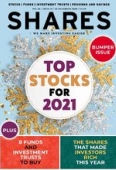Archived article
Please note that tax, investment, pension and ISA rules can change and the information and any views contained in this article may now be inaccurate.
New fears for retail, leisure and oil sectors as Covid bites

The rally in global markets reversed on 21 December as investors started to consider the implications of a more infectious strain of coronavirus. Share price declines were most prevalent in the retail, leisure and oil sectors, which shows that the market is worried about a delay to economic recovery.
Investors need to consider how these sectors could be affected as we move into 2021. In a nutshell, we see retailers issuing very downbeat trading statements in January as Tier 4 restrictions in the UK disrupt sales at the traditionally peak trading period, namely the run up to Christmas.
Those who have made money from buying leisure stocks in the November to early December rally may decide to take profit, so we see further weakness near-term in this sector.
The oil price also looks like it could give up recent gains and drift back until we get positive news on the vaccine roll-out globally.
GAPS ON SHELVES
Supermarkets have seen a spike in customer demand as so many people’s Christmas plans were altered by the new Government restrictions. At the same time, supply concerns for supermarkets and other retailers have been getting worse amid no progress with UK/EU trade talks, and foreign countries putting a ban on travel to the UK amid concerns about the spread of a new virus variant.
Supermarkets have been stockpiling goods for months, although the UK’s second-largest grocery chain Sainsbury’s (SBRY) warned on 21 December that gaps would start to appear on shelves if transport links with France were not quickly restored following disruption.
‘If nothing changes, we will start to see gaps over the coming days on lettuce, some salad leaves, cauliflowers, broccoli and citrus fruit – all of which are imported from the continent at this time of year,’ the firm said.
Longer term there are concerns that European drivers and hauliers will boycott the UK, leading a shortage of imports, in particular fresh produce.
With the official line still that Britain would rather leave the EU with no trade deal rather than a compromise, the French national hauliers’ federation warned ‘no driver wants to deliver to the UK, its freight supply is going to dry up’.
RETAILERS BUCKLING UNDER THE STRAIN
The issues around freight are cranking up the pressure on a retail sector already buckling under the strain of Brexit uncertainty and a digital Christmas.
The Government’s shock closure of non-essential shops in Tier 4, and supply chain disruption between the UK and continental Europe, arrived at the worst possible time for retailers and could prove catastrophic for weakened players in the hard-pressed sector.
Robbed of the last few crucial shopping days before Christmas, retailers will not only feel the impact of lost sales, they’ll also be stuck with unsold Christmas stock they’ll be unable to shift or have to sell at a huge margin-crimping discount in the New Year.
We should begin to find out the scale of the damage in the first weeks of 2021 with the release of the traditional Christmas trading updates from the sector.
Negative investor sentiment even extended to online retailers, the usual beneficiaries of a brick and mortar shutdown, with shares in AO World (AO.), ASOS (ASC:AIM) and Boohoo (BOO:AIM) in the red, amid fears about holiday period supplies and the impact of further job losses on purchasing power as a consequence of tightened restrictions continuing into 2021.
TRAVEL SECTOR CHAOS
The travel sector has again been plunged into chaos as the new Covid variant in the UK sparked travel bans from countries all over the globe.
Shares in the six major airline and package holiday stocks on the London market all tumbled on 21 December, with budget airline EasyJet (EZJ) and British Airways owner International Consolidated Airlines (IAG) the biggest fallers.
One of the key concerns for investors is whether the fresh round of disruption will affect the booking frenzy usually seen in the New Year as people plan their summer getaways.
Trading updates from travel firms in the first quarter of the year usually mention performance in the ‘important’ January and February period for summer bookings, but that performance could now be in doubt given consumer nervousness, particularly as talk grows over travel bans lasting for two to three months and reports emerge that the likes of British Airways will not issue refunds.
In a research note on tour operator TUI (TUI), analysts at Berenberg say there’s ‘absolutely no doubt’ over pent-up demand for a holiday and that this will be one of the first things people do once travel sanctions and the Covid-19 ‘overhang’ lifts.
But they warn there could be travel limitations ‘well into 2021’ and expect 2022 will be the first year when normality returns, with travel firms’ operational performance not returning to 2019 levels until 2023.
The latest developments also spell bad news for pub and restaurant stocks, as well as others like Cineworld (CINE), and will potentially delay their earnings recovery further. For a company like Cineworld, with its $8.2 billion of net debt, this is particularly troubling.
Important information:
These articles are provided by Shares magazine which is published by AJ Bell Media, a part of AJ Bell. Shares is not written by AJ Bell.
Shares is provided for your general information and use and is not a personal recommendation to invest. It is not intended to be relied upon by you in making or not making any investment decisions. The investments referred to in these articles will not be suitable for all investors. If in doubt please seek appropriate independent financial advice.
Investors acting on the information in these articles do so at their own risk and AJ Bell Media and its staff do not accept liability for losses suffered by investors as a result of their investment decisions.
Issue contents
Editor's View
Feature
First-time Investor
Great Ideas
- Stock pick for 2021: Alibaba
- Stock pick for 2021: Tracsis
- Stock pick for 2021: Eurofins Scientific
- Stock pick for 2021: JD Wetherspoon
- Stock pick for 2021: BHP
- Stock pick for 2021: Inspecs
- Stock pick for 2021: Convatec
- Stock pick for 2021: RWS
- Stock pick for 2021: PZ Cussons
- Stock pick for 2021: Diageo
- Stock pick for 2021: Qinetiq
- Stock pick for 2021: Ocado

 magazine
magazine











